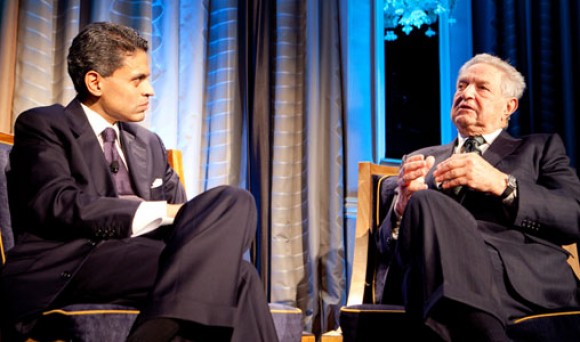
Touting the theory of mutually assured destruction, which prevented the U.S. and the Soviet Union from annihilating one another with nuclear weapons, Zakaria suggested that Iran could be deterred from using nuclear weapons. He quoted Gideon Rose, the editor of Foreign Affairs magazine, as saying that deterrence “is less disastrous than preventive war.” Rose is a former National Security Council official in the Clinton Administration and a prominent official of the Council on Foreign Relations.
Zakaria said that “While the Iranian regime is often called crazy, it has done much less to merit the term than did a regime such as Mao’s China. Over the past decade, there have been thousands of suicide bombings by Saudis, Egyptians, Lebanese, Palestinians and Pakistanis, but not been a single suicide attack by an Iranian.”
This is deceptive to the point of dishonesty. Why would he go back in history to the time of Mao’s China, but only examine suicide bombings over the last ten years?
The answer is that the facts about Iranian suicide bombings do suggest a craziness on the part of the regime. The strange formulation of “over the past decade” enabled him to ignore the fact that, on October 23, 1983, Iran ordered and carried out the suicide bombing of the U.S. Marine barracks in Lebanon, killing 241 American military personnel. An Iranian drove the car bomb into the barracks.
I attended and covered the 2003 trial in which the detailed evidence of the Iranian role in this bombing was presented in detail.
As I reported for AIM at the time, the trial involved a case brought against Iran by attorneys Steven Perles and Thomas Fortune Fay on behalf of the families of the Marines who were killed. Under a U.S. law passed in 1996, victims of terrorism can sue state sponsors of terrorism and collect damages from the assets that the terrorist regime may hold in the U.S.
The trial featured a videotaped deposition of a former terrorist insider named “Mahmoud,” who described in detail how Iran ordered the terrorists to attack the U.S. Marines and French troops in Lebanon, and revealed that the driver of the truck carrying the bomb was himself an Iranian.
In a videotaped deposition, former CIA officer Robert Baer testified that there was no doubt, based on the best intelligence information, that Iran was behind it. Baer said this bombing, and a previous bombing of the U.S. embassy in Beirut, Lebanon, were “acts of war.”
Dr. Reuven Paz of Israel testified via videotape that before the Marine barracks bombing Israel had intercepted a message from the government of Iran to its Ambassador in Syria, calling for military attacks on the foreign forces in Lebanon, including the Americans. Paz, who worked for the Israeli security service known as Shin Bet, said the intercepted message was provided to the CIA.
Admiral James Lyons, who was Deputy Chief of Naval Operations at the time, testified that he received a copy of the message, which described the need for a “spectacular action” against the Marines. But he received the message two days after the bombing.
Sergeant Steve Russell, who was guarding the embassy on that fateful day, said he had been warned about a possible car bombing of the barracks literally hours before it happened. He warned others, and stayed alert. But, as a “peacekeeper” under restrictive rules of engagement, he carried an unloaded gun and the compound was surrounded only by concertina wire. The car bomber drove through all of this into the barracks.
This evidence was accepted by U.S. District Judge Royce Lamberth, who found Iran liable for billions of dollars in damages.
Not only did Zakara ignore all of this, he stated previously, in a Newsweek article, that “Iranians aren’t suicidal.” This seems to be a common theme of his, in order to justify a do-nothing approach to the Iranians developing nuclear weapons. He wants us to believe that the regime can be rational and calm.
Ironically, the article carried the title, “Everything You Know About Iran Is Wrong.”
The author of The Post-American World, Zakaria seems eager to usher in this state of affairs by permitting the rise of dangerous regimes such as Iran with nuclear capability. Interestingly, Obama was photographed in 2008 carrying a copy of Zakaria’s book.
Frighteningly, his bio promotes Zakaria as “the most influential foreign policy adviser of his generation” and one of the top 100 global thinkers in 2010. Not surprisingly, he addresses hedge fund billionaire George Soros, funder of Media Matters and other left-wing causes, on a first name basis as “George.”
In a February 2011 interview that covered Iran and other issues, Zakaria asked Soros about the survival of the Iranian regime, which was being challenged by pro-democracy demonstrators. Soros said he was “convinced that the regime will not survive.”
Zakaria asked if the U.S. could do anything to challenge the regime internally. Soros replied, “I think Obama did actually there also a very good job by refusing to get involved and to be instigating regime change. This—this attempt to impose a regime change from the outside is counterproductive, because then the regime can accuse its opponents as being in the pay of a—of a foreign power, right?”
Zakaria replied: “Right.”
Not only has the regime survived, but there are numerous reports that Iran is preparing to use suicide-bomb boats to disrupt shipping in the Gulf.
However, Zakaria assures us that the Iranians are not crazy and don’t engage in such things—at least over the last decade.
Cliff Kincaid is the Director of the AIM Center for Investigative Journalism and can be contacted at cliff.kincaid@aim.org.







Speak Your Mind
You must be logged in to post a comment.